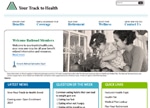SMART Local 55 members are experiencing the power of collective bargaining in new ways in the Tri-City area of Washington, where a new primary care clinic exclusively for union members and families has opened. Pacific Health Coalition — a member-governed health care group made up of 44 unions across Alaska, Washington, Oregon, California and Nevada — launched its first Washington-based clinic in June, offering primary care services to union members and their families who are part of the coalition.
That includes the members and dependents of Local 55 covered under the Northwest Sheet Metal Workers Healthcare Trust health plan.
In a statement to Tri-Cities Business News, Kolby Hanson, Local 55 regional manager, explained that “there is a great need for quality primary care that is accessible to members in the Tri-City and Spokane area. ‘The new clinics emphasize same-day or next-day appointments where a comprehensive exam can be performed. Having an on-site pharmacy will also be a nice convenience for our members,’ Hanson said.”
The region has recently encountered a major shortage in primary care providers. Previous reporting by the Business News noted that wait times at some of the region’s major clinics were between three and six months.
Patients at the new Coalition Health Center, on the other hand, can get an appointment within 48 hours, with access to primary care, blood work and prescriptions. According to local union leaders, the center will hire additional staff as needed to make sure wait times stay low. (Along with Local 55, the United Association of Plumbers and Steamfitters Local 598 and International Brotherhood of Electrical Workers Local 112 also currently have access to the clinic.)
At a time when cuts to Medicaid and funding for rural hospitals — due to the passage of the “One Big Beautiful Bill” — look set to negatively affect SMART members and working families nationwide, the Coalition Health Center is especially impactful. Not only does the clinic fill the gap in terms of access to health care; because the PHC consists of so many union members across the American West, representing 250,000 people total, it has the bargaining power to negotiate the best prices for members, according to local union officers.
The clinic, operated by the company Marathon Health, has four exam rooms, a laboratory, office space, a waiting area and a behavioral health area, plus a pharmacy. For non-primary-care needs, the Pacific Health Coalition has contracts with providers in the area who can offer needed procedures via referral.
All told, the Coalition Health Center is a brick-and-mortar representation of what our union fights for every day.
“The clinic is open Monday through Friday, 8:30 a.m. to 4:30 p.m., with early morning and evening appointments available to accommodate busy schedules,” Local 55 wrote to members.
“This is just one more way that the Northwest Sheet Metal Workers Healthcare Trust is working to keep our union families healthy, strong and protected.”


 UTU members with questions on how the Affordable Care Act will affect them and their families should visit the websites of their health care insurance carriers.
UTU members with questions on how the Affordable Care Act will affect them and their families should visit the websites of their health care insurance carriers.